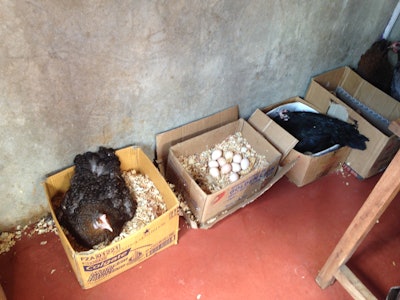
In 2015, members of the United Nations adopted the 2030 Agenda for Sustainable Development Goals (SDGs). They committed to achieving sustainable development over the next 15 years while ending poverty and hunger. Among the 17 SDGs adopted, the global egg sector can contribute to the achievement of several of them, either directly or indirectly.
SDG1 - No poverty
Globally, 1.3 billion people depend on livestock for their livelihood, and poultry represents the species mostly owned by smallholders. Activities to support and build the capacity of poultry smallholders will further improve the livelihoods of about 600 million poor farmers. Several national egg producer organizations, for example the South African Poultry Association, provide dedicated services targeting the smallholder egg sector.
SDG2 – Zero hunger
This SDG focuses on ensuring the access by all people, particularly infants, to safe, nutritious foods and an end to all forms of malnutrition.
We know that the daily consumption of one egg can contribute significantly to the reduction of stunting in young children. According to the Food and Agriculture Organization, in 2013, people in 50 countries – 34 in Africa and 12 in Asia -- consumed less than one egg per week. The global egg sector must find ways to make eggs -- a great source of high-quality proteins -- affordable to all in developing countries.
Smallholder farmers, keeping only a few animals, produce up to 80 percent of the food consumed in Asia and Africa. We must encourage them to use inputs, including vaccines and compound feeds. We must share the knowledge available in other countries and foster the adoption of more intensive production systems to improve production efficiencies, boost availability and reduce the price of eggs.
SDG3 – Good health and well-being
By producing an affordable food rich in high-quality proteins -- important components of a healthy immune system -- the egg sector provides good nutrition, which goes with good health and well-being.
SDG5 – Gender equality
Agriculture employs 1.3 billion people globally, with 97 percent living in developing countries.
Although women play a major role in the management of livestock species such as poultry, they do not have the same access as men to inputs such as feeds and vaccines. This lack of access leads to a reduction in their productivity of an estimated 30 percent. The egg sector should ensure that women are given similar access as men to information and technology, knowledge and inputs and promote their empowerment.
SDG12 – Responsible consumption and production
The egg sector contributes to this SDG by producing more eggs while reducing negative environmental impacts, such as greenhouse gas emissions and degradation of ecosystems. The welfare and well-being of birds, a strong focus of egg producers, is part of the desire for sustainable development in harmony with nature.
SDG13 – Climate action
Egg production has the lowest total emissions of greenhouse gases of all animal production and the lowest emissions per kilogram of protein produced. In addition, through the sharing and implementation of best practices, the egg sector can further reduce the emissions along its value chain and contribute significantly to this SDG.
SDG15 – Life on land
The production of animal feeds uses 35 percent of all cultivatable land and 20 percent of the available water. Any improvement in feed conversion, meaning more eggs produced with the same amount of feeds, will have a direct benefit on the environment and will promote the responsible and sustainable use of natural resources by the egg sector.
The SDGs offer the global egg sector a fantastic opportunity to further demonstrate its commitment to sustainable development and to the welfare of the planet and its people.

















